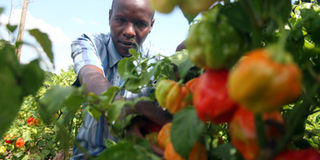Invest in agriculture to avert unrest due to unemployment

A red pepper farmer harvests produce. Experts believe the government is not taking agriculture seriously despite its critical role in national development citing ill equipped laboratories. PHOTO BY ABUBAKER LUBOOWA
What you need to know:
Critical. Research in agriculture is critical due to climate change, which has affected the most parts of the country reasoning that without adequate funding, small scale farmers will remain paupers due to poor yields.
The government is setting in motion a ticking bomb that will destroy gains made in the past years if investment in agricultural research to address youth unemployment and food security continue to be neglected, a former agriculture minister has warned.
Dr Victoria Ssekitoleko midweek told Jobs and Career in Kampala that Uganda has enough land and its population is not the largest in the world to have a sky-rocketing unemployment as it is.
Available data shows that youth unemployment is worse in urban areas, at about 40 per cent. Only 21 per cent are in paid employment. Ubos says that nine per cent are employed in wholesale trade, retail trade and repair activities while those in the manufacturing sector remains at an average of four per cent.
The joblessness rates, she said, are due to insensitivity by the regime to put money into research that would lead to innovations to create value chain jobs and increase soil productivity to hook the idle youth who abandon the country’s number one employer due to poor prices and yields.
“Agriculture research will lead to more [food] production and generate more jobs either by getting more people [men] to work on the land because they are convinced that maize production on an acre can produce 5tons,…..or if we can produce more crop and livestock we can generate more jobs on the farm,” Ms Ssekitoleko said.
She made the remarks at a high level agriculture meeting organised by Civil Society Budget Advocacy Group (Csbag) aimed at feasible investment options in the agriculture sector to increased food security and nutrition in Uganda as part of the Farm Power 2014 events.
Farm Power is an annual event spearheaded by non-government oragnisation- Food Rights Alliance and this year’s theme is “Celebrating 2014 the Year of Agriculture Food Security and Nutrition.
Dr Fred Muhumuza, a former adviser in the Ministry of Finance joined Dr Ssekitoleko in agitating for agriculture research investment.
He said government is not taking agriculture seriously despite its critical role in national development citing ill equipped laboratories, meager budgetary allocations, lack of political will to do right things, corruption and failure to enact laws to spur seed research.
Dr Muhumuza said, “….the school system we have undermines sciences. You begin encouraging sciences in Senior one but you are supposed to begin in primary. Scientists are public property. They are not like lawyers or business administrators, their output is of national importance….that is why we need funding,”
He said local farmers are losing out on selling seeds to most agribusiness factories in the country involved in oil making as majority import sunflowers from other countries because the local ones do not have enough oil because of quality of seeds something that could be addressed if there was funding to do research.
Csbag coordinator Julius Mukunda said research in agriculture is critical due to climate change which has affected most parts of the country reasoning that without adequate funding, small scale farmers will remain paupers due to poor yields.
Government in 2009 signed a memorandum of understanding with some financial institutions and initiated Agriculture Credit Facility (ACF) to provide medium and long term loans to farmers to help them add value to their produce; hence more job creation, increase productivity among others.
In his 2012/3 report, the Auditor General notes that 213 of people had benefited from ACF and disbursement of fund increased from Shs50.46bn to Shs118.5 in 2011.
The AG however revealed that the majority of the intended beneficiaries of the scheme are not getting it but rather the rich farmers.


